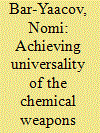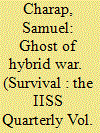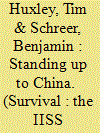|
|
|
Sort Order |
|
|
|
Items / Page
|
|
|
|
|
|
|
| Srl | Item |
| 1 |
ID:
146360


|
|
|
|
|
| Summary/Abstract |
A century ago, at Ypres, in Belgium, the use of chemical weapons in the First World War began. Ninety years ago, in Geneva, a protocol to ban the use of chemical weapons was signed. Two years ago, the attack on Ghouta, on the outskirts of Damascus, forced Syria’s accession to the Chemical Weapons Convention (CWC). A promise to eliminate Syria’s chemical-weapons stocks followed. Yet today, in Syria and Iraq, these abhorrent weapons continue to be used.
|
|
|
|
|
|
|
|
|
|
|
|
|
|
|
|
| 2 |
ID:
146351


|
|
|
|
|
| Summary/Abstract |
Unlike its Soviet predecessor, the contemporary Russian military is neither sized nor structured for conquest to the shores of the Atlantic and Mediterranean. But this does not mean it deserves the disdain it often receives in the Western commentariat. Indeed, the Russian military is increasingly capable of helping to achieve what seem to be the Kremlin’s actual strategic objectives in Europe. Many observers, including some in NATO and Western governments, think Moscow is interested in recreating a Russian sphere of influence and even, if possible, hegemony in its near abroad, including along its western periphery. This objective is apparent from Russia’s seizure of Crimea and intervention in Ukraine but also its earlier war with Georgia, its presence there and in Transdniestr, its strong hand in Belarus, and its domineering rhetoric and provocative military exercises directed towards the Baltic states and other Eastern European nations. Moreover, many Western leaders judge that Russia, more ambitiously, is keen to find ways to corrode or even break the cohesion of the NATO Alliance, thereby diminishing American involvement and opening opportunities for Russian leverage in Europe.
|
|
|
|
|
|
|
|
|
|
|
|
|
|
|
|
| 3 |
ID:
146352


|
|
|
|
|
| Summary/Abstract |
Following Moscow’s invasion of Crimea and support for the insurgency in eastern Ukraine, the concept of ‘hybrid war’ has emerged as a catch-all description for the new Russian threat to European security. The concept itself – a blending of conventional and non-traditional tactics to achieve political–military objectives – is not novel. But its prominence in Western analysis of Russia’s actions over the past two years surpasses all previous usage. In this same period, Russian military strategists have also written extensively on hybrid warfare. The assumptions underlying both perspectives are equally misguided.
|
|
|
|
|
|
|
|
|
|
|
|
|
|
|
|
| 4 |
ID:
146354


|
|
|
|
|
| Summary/Abstract |
This was perhaps Pope Francis’s most difficult foreign tour. For a 78-year-old Argentinian touching US soil for the first time, it meant arriving at his own Far North, his cultural frontier. Here was ‘the land of the free and the home of the brave’, as he recognised at the very beginning of his speech in front of the US Congress, on 24 September 2015 – a captivating start, as to this South American pontiff the US is not simply a great democracy pursuing freedom. It also embodies images of the fatherland of capitalism, of Wall Street’s wild finance, of military primacy and wars, of megacities’ ghettos: all things claimed as seeds of Jorge Mario Bergoglio’s potential anti-Yankeeism. Yet during his 22–27 September trip he was able to cover all the most sensitive topics without great controversy.
|
|
|
|
|
|
|
|
|
|
|
|
|
|
|
|
| 5 |
ID:
146355


|
|
|
|
|
| Summary/Abstract |
On 28 September 2015, the northern Afghan city of Kunduz fell to the Taliban. Some 5,000 Afghan soldiers, police and militia retreated as hundreds of Taliban swept in, joining insurgents who had infiltrated the city beforehand. This was a hard-won victory. Massing fighters in the north of the country, the Taliban had by degrees taken control of districts around Kunduz – Afghanistan’s fifth-largest city – over the preceding two years. The Afghan government vowed to quickly retake Kunduz, but this meant the army would have to fight through Taliban-held territory. Supported by American airstrikes and special forces, Afghan commandos began to clear the Taliban out of the city on 1 October. The city’s recapture took two weeks.
|
|
|
|
|
|
|
|
|
|
|
|
|
|
|
|
| 6 |
ID:
146356


|
|
|
|
|
| Summary/Abstract |
On a rainy summer day in Afghanistan, Staff Sergeant Craig Cooper was returning to his operating base with his marine teammates. They were riding in the very best vehicles industry innovators have to offer: RG31 and RG33 mine-resistant armoured personnel carriers, or MRAPs. The roads surrounding their remote combat outpost were primitive, and the rain had produced treacherous conditions. As Cooper and his teammates discussed their deployment, the lead truck suddenly steered left, then stopped. Time slowed down as Cooper observed the road beneath the MRAP fall away. As Cooper and his colleagues attempted to pull the truck back onto the still crumbling road, the remainder disintegrated, causing the previously upright vehicle to flip violently onto the driver’s side. It sank rapidly into more than 150cm of water, trapping the men inside.
|
|
|
|
|
|
|
|
|
|
|
|
|
|
|
|
| 7 |
ID:
146359


|
|
|
|
|
| Summary/Abstract |
The Taiwan–US relationship is a tacit alliance, one that has always been contentious. Although the US severed its diplomatic ties with the Republic of China when it recognised the People’s Republic of China (PRC) in 1979, the Taiwan Relations Act of the same year enshrined an unofficial relationship with Taipei that has remained close over the past four decades. Under the provisions of that act, the US continues to sell defensive weapons to Taiwan and insists that any resolution of the Taiwan issue must be peaceful. Washington’s commitment to Taiwan was evident when the United States sent two aircraft carriers to the Taiwan Strait during the 1995–96 missile crisis.
|
|
|
|
|
|
|
|
|
|
|
|
|
|
|
|
| 8 |
ID:
146357


|
|
|
|
|
| Summary/Abstract |
During the course of 2015, China used land-reclamation techniques to expand many of the features that it occupies in the South China Sea, most of which were then militarised. This development – alongside many other important signs of assertiveness, including China’s large-scale naval modernisation; its expanding deployment of maritime paramilitary forces to coerce other Asian states, including Japan, in the East China Sea; its efforts to undermine the unity of the Association of Southeast Asian Nations (ASEAN); and its attempted creation of an alternative regional security architecture – not only indicated Beijing’s intent to reinforce its maritime claims, but also highlighted China’s drive to create a new regional order in which it plays a dominant and arbitrating role. Such an order could only undermine the interests of other regional states and the West. While the success of these efforts is by no means inevitable, the United States and its regional allies and security partners will need to respond more firmly to China, particularly in the South China Sea (SCS). By late October 2015, an initial ‘freedom of navigation’ patrol by the US Navy, which took one of its ships inside the 12-nautical-mile territorial waters claimed by China around one of the features that it occupies in the SCS, indicated that Washington recognised the necessity of stronger countermeasures. However, to succeed, this tougher approach will need to be both persistent and supported by US allies and security partners in the region and beyond.
|
|
|
|
|
|
|
|
|
|
|
|
|
|
|
|
| 9 |
ID:
146350


|
|
|
|
|
| Summary/Abstract |
In the spring of 2015, a sudden change occurred in population flows between the southern and northern banks of the Mediterranean. Overall numbers of new asylum seekers climbed from fewer than 58,000 in April to close to 89,000 in June. The number of new applicants hailing from Syria nearly doubled, from slightly under 11,000 to close to 21,000.1 This was just the beginning; the wave of refugees picked up during the summer, with the movement of some 190,000 Syrians during July, August and September 2015, three times the number that had arrived during the same period in 2014. This would represent a yearly rate of around 672,000. By late October, a cumulative total of 507,000 Syrians were seeking or had secured an abode within the European Union.
|
|
|
|
|
|
|
|
|
|
|
|
|
|
|
|
| 10 |
ID:
146353


|
|
|
|
|
| Summary/Abstract |
In holding Russia’s military behemoth to a stalemate in President Vladimir Putin’s undeclared war on Ukraine, Kiev has won an improbable victory. After a year of intensive shelling during a poorly observed truce in the Donbas, the big guns went silent there on 1 September 2015 and have stayed silent ever since.
Yet as the immediate existential threat recedes, the oligarchs who once personally financed the country’s defence seem to be trying to snatch defeat from the jaws of victory. They have forgotten their original shock at Moscow’s lightning annexation of Crimea in March 2014 and are reverting to their cozy personal exploitation of Ukraine’s patrimony. This is precisely the kind of dysfunction that Putin is now counting on to make Kiev implode, even as he eases outside pressure by accepting military deadlock in eastern Ukraine.
|
|
|
|
|
|
|
|
|
|
|
|
|
|
|
|
|
|
|
|
|